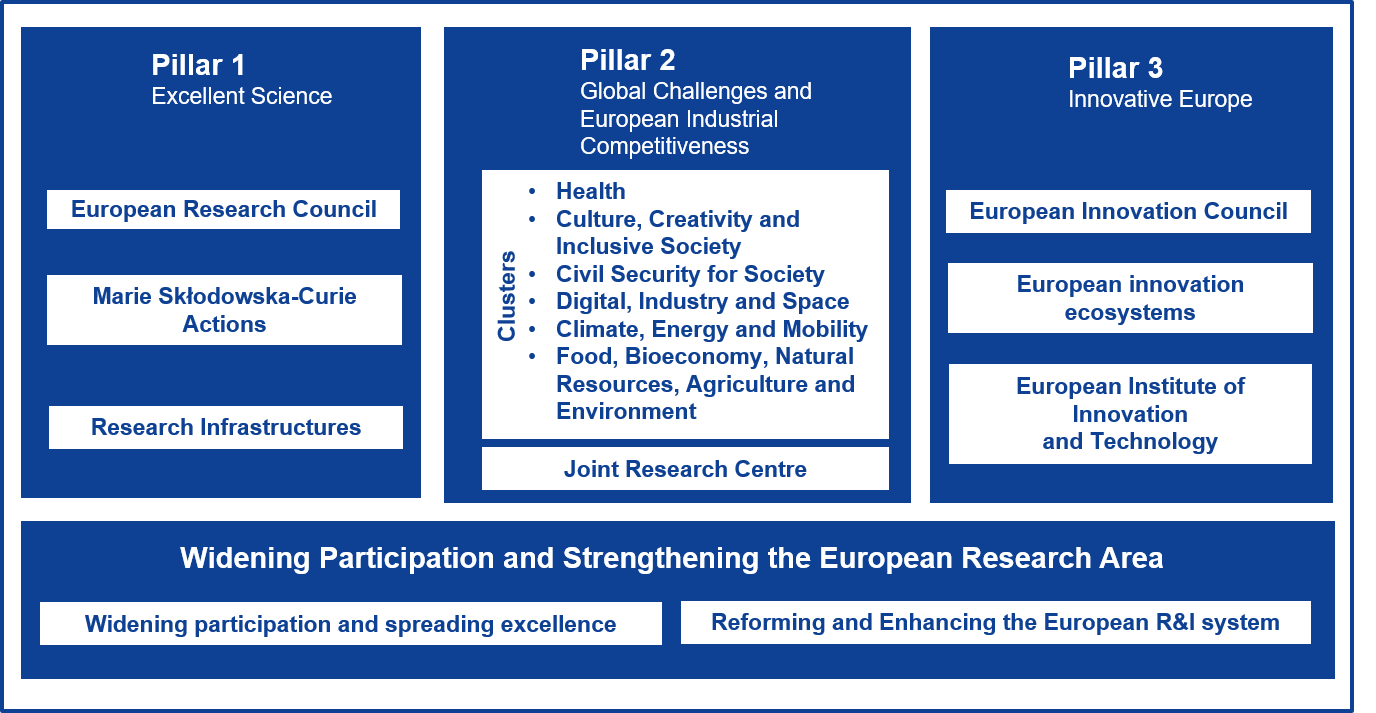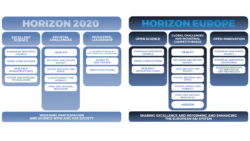Horizon Europe
Please click the drop-down menu below to find out more about the Horizon Europe Framework Programme, including:
- the range of funding opportunities available under Horizon Europe and its programme structure.
- the main schemes under each pillar and what they fund.
What is Horizon Europe?
The Horizon Europe Framework Programme is the European Commission’s (EC) main mechanism for funding research & innovation.
It is a seven year programme (2021-2027) that offers grants through open and competitive calls. With a budget of €95.5 billion, it funds a variety of activities: from individual fellowships to large scale, multi-partner research.
The programme succeeds to the Horizon 2020 programme (2014-2020).
Programme Structure, range of funding opportunities & where to find them
Where to find funding opportunities?
Funding opportunities are:
- available under specific schemes, organised under three pillars (see diagram below).
- set out in multiple annual Work Programmes (WPs). The current WPs run for the year 2023-2024. All published WPs can be found under the H Europe reference documents (under 'Work programme & call document').
- advertised through calls for proposals on the EU Funding Opportunities and Tenders Portal.
A range of opportunities covering the whole R&I cycle
Horizon Europe schemes and calls for proposals support different types of research projects at different development stages, throughout the R&I cycle.
This includes: fellowships; collaborative projects; accompanying projects aiming to support research and innovation (eg networks, dissemination activities). Calls for proposals can have:
- a bottom up approach (investigator-driven topics).
- a top-down approach (priority topics defined by the EC).
- a mixed approach (mainly for calls under the 'Missions'- see pillar 2).
Pillar Structure & Schemes
Horizon Europe is structured under 3 pillars. Each pillar has its main focus, with different schemes under them to support their objectives.
- Excellent Science
Bottom-up, researcher led projects to increase the EU’s global scientific competitiveness. - Global challenges & European Industrial Competitiveness
- Underpinning EU policies & Sustainable Development Goals (SDGs), collaborative projects to support key technologies & solutions for societal, technological and/or industrial challenges.
- Sets EU-wide missions to tackle some of our greatest global challenges. - Innovative Europe
Projects to support market-creating breakthroughs & the overall EU innovation landscape.

Pillar 1 - Excellence Science
European Research Council (ERC) Grants
- Bottom-up calls
- Funds individual fellow with a team
- Frontier, ‘high-risk, high-gain’ research
- Any fields/topics, mainly standard and applied research
Marie Skłodowska-Curie – Postgraduate Fellowships (PF)
- Bottom-up calls
- Fund fellowships (involved moving or having recently moved to another country)
- For researchers with a maximum of eight years experience in research from the date of the award of their PhD degree (excluding career break, experience outside research, experience in research in Third Countries etc.)
- Any fields of research, mainly standard and applied research.
- Focus is on career, training and skills development in academia, industry and other non-academic sectors
Marie Skłodowska-Curie – Doctoral Networks
- Fund doctoral programmes delivered by an interdisciplinary/inter-sectoral partnerships of organisations from across Europe and beyond
- Any fields/topics of research
Marie Skłodowska-Curie – Research and Innovation staff exchange programmes (RISE)
- Exchange programmes
Pillar 2 - Global Challenges and European Industrial Competitiveness
Clusters - Global Challenges & Industrial Competitiveness
- Top-down calls for collaborative projects in defined intervention areas under 6 clusters.
- Address EU and global policy challenges, contribute to SDGs.
- Funding aims to support research into societal challenges and reinforce technological and industrial capacities.
- Promote interdisciplinary, cross-sectoral, cross-policy, cross-border and international cooperation.
The 6 clusters areas are:
- Health
- Culture, Creativity and Inclusive Society
- Civil Security for Society
- Digital, Industry and Space
- Climate, Energy and Mobility
- Food, Bioeconomy, Natural Resources, Agriculture and Environment
Missions
- Aim to deliver solutions to global challenges. They are commitments to solve some of the greatest global challenges.
- Adopt a mission-driven approach. One of the main novelties on Horizon Europe.
- Have a mixed of top-down & bottom-up elements.
- Adopt a portfolio approach. Actions are expected to stretch across different disciplines and parts of Horizon Europe. Portfolios will have a mixed of project types: such as collaborative projects, prizes or financing mechanisms etc.
They are 5 identified missions. Each mission will operate as a portfolio of actions.
- Adaptation to climate change
- Cancer
- Restore our oceans and waters
- Climate-neutral and smart cities
- A soil deal for Europe
Since they are new, missions are by definition ‘experimental’, EU missions will:
- be bold, inspirational and widely relevant to society
- be clearly framed: targeted, measurable and time-bound
- establish impact-driven but realistic goals
- mobilise resources on EU, national and local levels
- link activities across different disciplines and different types of research and innovation -thus going beyond individual projects or partnerships and creating strong synergies.
- make it easier for citizens to understand the value of investments in research and innovation
- contribute to the goals of the European Green Deal, Europe’s Beating Cancer Plan as well as the UN Sustainable Development Goals.
Pilar 3 - Innovative Europe
EIC Pathfinder Open (Previously known as FET-Open in H2020)
- Scheme supporting future and emerging breakthrough technologies.
- Funds collaborative research projects with a bottom-up approach (no predefined topics).
- Funds early-stage development of future technologies (based on high-risk/high-gain science-towards-technology breakthrough research).
- Expected outcomes are to realise the proof of principle & validate the scientific basis of the future technology
EIC Pathfinder Challenges
- Top-down challenge-driven calls in 5 challenges (strategic priorities of the EU).
- Scheme supports tackling specific technology breakthroughs.
- Funds collaborative and mono-beneficiary projects
- Funds cutting-edge/innovative technology solutions to disrupt a field, a market or create new opportunities via high-risk/high-gain research.
EIC Transition Open
- Bottom-up scheme
- Funds consortium-based or mono-beneficiary projects.
- Funds activities going beyond the experimental proof of principle.
- Applications must build on results from eligible previous projects (e.g.ERC PoC, FET /EIC Pathfinder).
- Support both the maturation and validation of novel technologies in the lab and in relevant application environments and the development of a business case & business model towards an innovation's future commercialisation.
Notables Changes compared to H2020
The tagline for the programme has been “evolution not revolution”. As a result, there are plenty of similarities with H2020.
Both Horizon Europe and Horizon 2020 consist of three pillars, as well as horizontal actions.

Global Challenges and European Industrial Competitiveness
This Pillar essentially combines Pillars 2 and 3 from H2020 (Industrial Leadership and Societal Challenges) into a single pillar comprising six clusters, based on UN Sustainable Development Goals (SDGs).
There are now a mix of:
- top-down, policy-based topics (as with H2020) and;
- topics adopting a mission-oriented approach (a novelty of Horizon Europe), where a grand challenge is set that invites potential solutions from consortia.
Five mission areas have been identified, which are listed under Pillar 2.
European Innovation Council (EIC)
The disparate funding mechanisms for innovation-focused projects have now been brought together under the EIC. This includes established schemes such as FET (now called Pathfinder under Horizon Europe) and the Fast Track to Innovation programme that was piloted in H2020.
The two main new funding instruments are:
- EIC Pathfinder - to support scientific and technological research, proof of concept and prototypes for technology validation. It will also support transition activities to help innovators develop pathways to commercial development.
- EIC Accelerator - Funding and investments through the EIC Fund for individual start-ups and small companies to develop and scale up game changing innovations.
Open Science & Citizens involvement
Following pilots in H2020, open access publishing and research data is now mandatory as default. There is a higher focus on citizen-based approaches, including public engagement both of research results and the value therein, as well as in developing the programme. This also aims to address public scepticism of how public research funding is spent.
H2020 vs Horizon Europe
Key similarities and differences between H2020 and Horizon Europe are summarised here:
| H2020 | Horizon Europe | |||
|---|---|---|---|---|
| Duration | 2014-2020 | 2021-2027 | ||
| Budget | €79.2bn | €95.5bn (tbc) | ||
| Structure | 3 main “pillars” : 1. Excellence 2. Leadership in Enabling& Industrial Technologies (LEIT) 3. Societal Challenges | 3 main “pillars”: 1. Excellent Science 2. Global Challenges and European Industrial Competitiveness 3. Innovative Europe | ||
| Common Schemes | ERC, FET, Marie Sklodowska-Curie, Research Infrastructure | |||
| Differences in Collaborative Research | • Top-down • 10 Challenges across Societal Challenges and LEIT • Industry-facing calls in LEIT • Innovation through specific schemes and within all calls | • Top-down and bottom-up • 6 clusters within Global Challenges, based on UN SDGs • Industrial benefits within all Global Challenges • EIC for innovation-focussed activities | ||
Where do I find further information?
- Please consult our EU Funding brochure which provides an overview of the key Horizon Europe opportunities and the support we can offer you.
- Please consult our Events page to view:
- the latest events relating to EU funding and Horizon Europe. Events are added regularly as and when they are announced.
- the slides and recordings of past events the EU Team has run (past events & slides can also be consulted on our EU Funding@Leeds Stream Channel). - Subscribe to our EU Team newsletter for updates on the latest EU funding developments.
- Follow us on Twitter: @EUFundingleeds
UK Participation in Horizon Europe
As part of the Brexit deal it was agreed that the UK will participate in Horizon Europe as an Associated Country (access almost on the same terms as an EU Member State).
On 4th December 2023, the UK's association to Horizon Europe was officially sealed, meaning that the UK is now formally associated to Horizon Europe. This means that the UK can participate in, and receive EU funding from, all calls from the 2024 Work Programme onwards. UK partners can also act as Coordinator.
Please see the Post Brexit Environment and UK Association page for full details.
Please contact us if you have any EU-related queries.
